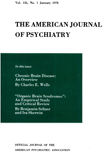Denial and affirmation in illness and health
Abstract
Recent research has shown that patients with life-threatening illnesses have improved chances of survival if, rather than recognizing the serious consequences of their illness, they employ the psychological defense mechanism of denial. Reexamination of these data suggests that unexamined psychological factors which promote a positive view of health are of equal or greater importance in explaining those results. Health care professionals, concerned with diagnosis and treatment, primarily focus attention on illness and its denial or recognition. To expand this perspective to include factors for health, the author presents a four-cell paradigm of illness, health, denial, and affirmation. The paradigm is illustrated with examples of common problems in medical care.
Access content
To read the fulltext, please use one of the options below to sign in or purchase access.- Personal login
- Institutional Login
- Sign in via OpenAthens
- Register for access
-
Please login/register if you wish to pair your device and check access availability.
Not a subscriber?
PsychiatryOnline subscription options offer access to the DSM-5 library, books, journals, CME, and patient resources. This all-in-one virtual library provides psychiatrists and mental health professionals with key resources for diagnosis, treatment, research, and professional development.
Need more help? PsychiatryOnline Customer Service may be reached by emailing [email protected] or by calling 800-368-5777 (in the U.S.) or 703-907-7322 (outside the U.S.).



